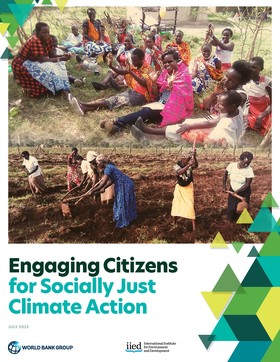Engaging citizens for socially just climate action

Climate change governance poses particular challenges for citizen engagement in decision-making and policy processes. Climate risk management and governance are affected by uncertain (and often limited) evidence about future changes in specific locations, longer time horizons for expected changes relative to policy cycles, and the multisectoral nature of climate change. Although climate impacts cut across traditional policy domains and institutions, a whole-of-government approach to addressing climate change is still weak. The impacts of climate change also differ for various groups, depending on intersecting attributes of social difference, including gender, race, ethnicity, class, and disability, among others. It is especially important that citizens are engaged meaningfully in climate policy processes to ensure their needs and priorities are captured in policy-making processes and policy implementation.
This paper identifies six main challenges to meaningful engagement in climate decision-making: unequal “presence” in decision-making spaces (unequal participation); unequal political capabilities for climate action; unequal power to influence decisions; perceived high costs and low efficiency; challenges of legitimate representation due to scale; and access to digital tools and climate information. By reviewing literature on engagement and participation, the paper shows that how participants are selected, how decisions are made, the mode of engagement, and the relationship to power and authority can help overcome challenges to engagement.
Governments planning to ensure meaningful citizen engagement of traditionally disenfranchised individuals and groups in climate policy and action through local and national platforms are the primary audience of this paper. Secondary audiences include development organisations, donors and philanthropies, and civil society actors that advocate for and support the processes that enable the meaningful engagement of citizens in climate policy and action.
Cite this publication
Available at https://www.iied.org/22256g
